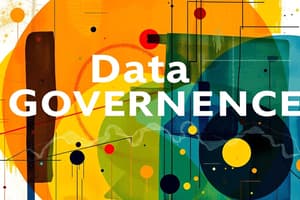Podcast
Questions and Answers
What role does schema enforcement play in data lakehouses?
What role does schema enforcement play in data lakehouses?
- It simplifies data access for all users.
- It ensures data conforms to a predefined structure. (correct)
- It eliminates the need for any data governance.
- It allows for the flexible addition of any data type.
What is the primary benefit of ACID transactions in data lakehouses?
What is the primary benefit of ACID transactions in data lakehouses?
- They primarily focus on data storage efficiency.
- They increase the speed of data processing.
- They ensure data operations are completed consistently. (correct)
- They provide unlimited access to all users.
How do fine-grained access controls in data lakehouses enhance data quality?
How do fine-grained access controls in data lakehouses enhance data quality?
- They help in setting permissions at a granular level. (correct)
- They allow all users to access any data regardless of permissions.
- They integrate loosely with data governance policies.
- They eliminate the need for monitoring data access.
Which function do data quality tools in data lakehouses primarily serve?
Which function do data quality tools in data lakehouses primarily serve?
What ensures a unified data management approach in data lakehouses?
What ensures a unified data management approach in data lakehouses?
What does the improvement in data lineage tracking help achieve?
What does the improvement in data lineage tracking help achieve?
How does automated quality checking function in data lakehouses?
How does automated quality checking function in data lakehouses?
What is one of the benefits of optimized performance in data lakehouses?
What is one of the benefits of optimized performance in data lakehouses?
Match the following data lakehouse enhancements with their descriptions:
Match the following data lakehouse enhancements with their descriptions:
Match the following aspects of data governance with their functions:
Match the following aspects of data governance with their functions:
Match the following features of data lakehouses with their benefits:
Match the following features of data lakehouses with their benefits:
Match the following data lakehouse capabilities with their impacts on data quality:
Match the following data lakehouse capabilities with their impacts on data quality:
Match the following descriptions to the corresponding data lakehouse characteristics:
Match the following descriptions to the corresponding data lakehouse characteristics:
Match the following principles with their relevance in data lakehouses:
Match the following principles with their relevance in data lakehouses:
Match the following improvements in data lakehouses with their results:
Match the following improvements in data lakehouses with their results:
Match the following terms related to data governance with their definitions:
Match the following terms related to data governance with their definitions:
Flashcards are hidden until you start studying
Study Notes
Data Governance and Management
- Data lakehouses enforce schemas, ensuring that data conforms to a predefined structure, reducing the risk of inconsistent or malformed data.
- Tracking data lineage allows for understanding data origin, transformations, and usage, crucial for maintaining data quality and compliance.
ACID Transactions
- Data lakehouses support ACID transactions, guaranteeing that all data operations are completed successfully and consistently, preventing partial updates and maintaining data integrity.
- ACID transactions enable concurrent read and write operations without compromising data quality.
Fine-Grained Access Controls
- Data lakehouses implement fine-grained access controls, allowing administrators to set granular permissions, ensuring only authorized users can access or modify data.
- Detailed access logs and audit trails monitor data usage and identify unauthorized access or changes.
Data Quality Tools
- Data lakehouses include built-in tools for validation and cleansing, identifying and correcting errors in the data before analysis.
- Regular automated checks monitor data quality and alert users to any issues, ensuring accuracy and reliability.
Unified Data Management
- Data lakehouses provide a unified platform for all data types, reducing data silos and ensuring consistent management.
- Optimized performance for SQL queries and BI-style reporting ensures data is quickly accessible for analysis.
Data Lakehouse Architecture - Databricks
- Improved Data Quality: Databricks Data Lakehouse architecture offers significant enhancements in data quality compared to traditional data lakes. This is achieved through stronger data governance, ACID transactions, fine-grained access controls, and built-in data quality tools.
Data Governance and Management
- Schema Enforcement: Enforces predefined schemas, reducing inconsistent or malformed data entry.
- Data Lineage Tracking: Provides clear understanding of data's origin, transformations, and usage, crucial for data quality and compliance.
ACID Transactions
- Atomicity, Consistency, Isolation, Durability (ACID): Ensures all data operations complete successfully and consistently, preventing partial updates and maintaining data integrity.
- Concurrent Operations: Supports concurrent read and write operations without compromising data quality.
Fine-Grained Access Controls
- Granular Permissions: Allows administrators to set permissions at specific levels, safeguarding data quality and security.
- Auditing: Detailed access logs and audit trails monitor data usage and identify unauthorized access or changes.
Data Quality Tools
- Validation and Cleansing: Includes built-in tools to identify and correct errors in the data before analysis.
- Automated Quality Checks: Regular checks monitor data quality and alert users to issues, ensuring accurate and reliable data.
Unified Data Management
- Single Source of Truth: Combines data lake and data warehouse capabilities, creating a unified platform for managing all data types. This eliminates data silos, ensuring consistent data management.
- Optimized Performance: Enhanced performance for SQL queries and BI reporting ensures high-quality data is quickly accessible for analysis.
Studying That Suits You
Use AI to generate personalized quizzes and flashcards to suit your learning preferences.




